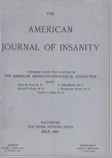ALZHEIMER'S DISEASE—THE SO-CALLED JUVENILE TYPE
Abstract
1. Alzheimer's disease is to be considered up to the present as a definite clinico-pathological entity. Its pathology is not pathognomonic, the clinical data being therefore essential for the classification of cases into Alzheimer's disease.
2. The subdivision into a juvenile form of Alzheimer's disease does not seem as yet justified in its material presentation. Of 10 cases, reported in the literature, occurring at an age prior to the presenile stage, seven presented either insufficient pathological and clinical elements or typical pathology but non-characteristic clinical symptoms. Their inclusion in the group of Alzheimer's disease, cannot therefore be made without unduly stretching the original conception of the malady.
3. In addition to the case described in this presentation, three others have been reported in the literature of typical Alzheimer's disease from both the pathological and the clinical aspects, in which the age limit varied at the most between 37 and 41 years. The narrow variation of the age limit and the small number of these cases justifies, we feel, our conservative attitude toward the creation of a nosological variety termed "juvenile form of Alzheimer's disease."
4. The doubt cast on the generally accepted conception of Alzheimer's disease as a presenile psychosis, doubt based upon the occurrence precisely of the disease in its so-called "juvenile form" is therefore somewhat premature. Additional evidence is needed for such a conclusion.
5. A report of a case, in which all clinical and pathological data exclusive of the age, correspond to Alzheimer's disease, illustrates the expressed ideas.
Access content
To read the fulltext, please use one of the options below to sign in or purchase access.- Personal login
- Institutional Login
- Sign in via OpenAthens
- Register for access
-
Please login/register if you wish to pair your device and check access availability.
Not a subscriber?
PsychiatryOnline subscription options offer access to the DSM-5 library, books, journals, CME, and patient resources. This all-in-one virtual library provides psychiatrists and mental health professionals with key resources for diagnosis, treatment, research, and professional development.
Need more help? PsychiatryOnline Customer Service may be reached by emailing [email protected] or by calling 800-368-5777 (in the U.S.) or 703-907-7322 (outside the U.S.).



